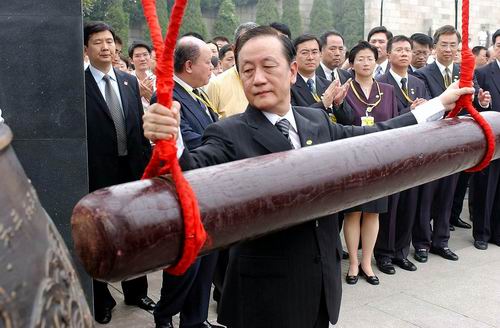
Yok Mu-ming, chairman of the New Party of Taiwan, bangs a log against
the "Peace Bell" at a memorial hall commemorating the Nanjing Massacre victims
in Nanjing, Jiangsu Province yesterday.- Xinhua
Yok Mu-ming, chairman of the New Party of Taiwan, offered condolences
yesterday morning to victims of the Nanjing Massacre, an atrocity committed by
the invading Japanese troops in December 1937 during World War II.
At the
Memorial Hall of Compatriots Murdered in the Nanjing Massacre, Yok called on all
Chinese compatriots to draw lessons from history, be united and make concerted
efforts to promote peace, prosperity and reunification of the
motherland.
"Discord among the people and secession of the nation will only
result in contempt, bullying and killing by others," he said.
Those who
cannot remember the past are condemned to repeat it, Yok said, urging the
Japanese militarist and rightist forces to repent for their wartime crimes and
take history as a mirror.
He rang a giant peace bell erected on the square of
the Memorial Hall to pray for peace and wrote an inscription saying, "Never
forget national humiliation."
More than 300,000 Chinese civilians and
soldiers were slain during the infamous Nanjing Massacre, which occurred after
the forceful occupation of Nanjing on December 13, 1937, by the intruding
Japanese troops. About 20,000 women were raped and killed, and one-third of the
houses in the city burned down in the six-week atrocity, which was taken as one
of the three bloodiest massacres of World War II.
The Nanjing municipal
government built a memorial hall at the Jiangdong Gate in 1985 in memory of the
victims.
The hall had received at least 11 million visitors from home and
abroad by the end of June, including more than 500,000 people from
Japan.
Earlier, Yok and his entourage paid tributes at the Mausoleum of Dr
Sun Yat-sen, forerunner of the Chinese democratic revolution that ended feudal
rule in the 1911 Revolution.
Yok laid a floral wreath before the sedentary
statue of Dr Sun. The New Party delegation also followed the traditional Chinese
way of paying respect to the deceased by making three bows toward the seated
statue of Dr Sun, and then visited the chamber where his coffin is
placed.
The mausoleum, one of the featured sites of unique historical
interest in Nanjing, capital of Jiangsu Province, is on the southern slope of
the Purple Hills.
Before his departure from the mausoleum, Yok wrote an
inscription and gave a brief speech calling for more efforts for the
reunification of the Chinese mainland and Taiwan.
The New Party delegation
left Nanjing for Dalian in the afternoon.
Before boarding the plane, Yok and
his entourage were met and given a banquet by Luo Zhijun, secretary of the
Nanjing municipal committee of the Communist Party of China.
Yok and his team
arrived in Nanjing from Guangzhou, Guangdong Province, on Thursday afternoon,
where they were received by Li Yuanchao, secretary of CPC's Jiangsu Provincial
Committee.
Their eight-day mainland tour, called "a journey of the Chinese
nation," began on July 6 and coincides with the 60th anniversary of China's
victory in the war against Japanese aggression.
After Dalian, the third-leg
of the tour, the delegation will head to Beijing.



